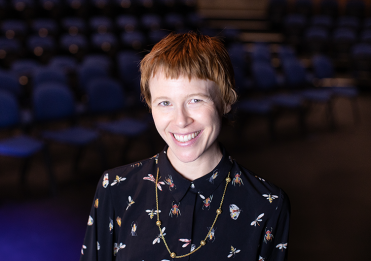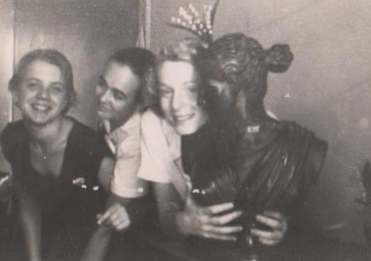Today, the Drama Program at Brisbane Girls Grammar School offers students an extensive range of activities and performances across the year, and the history of Drama within the School is closely aligned to the development of this subject area within Queensland.
Current students study drama in Year 7 and elect to continue studying the subject all the way through to Year 12. Students also have the opportunity to audition for productions centered around different Year level groups: Year 7 and 8; Year 9 and 10 and the Senior Drama Production.
The productions focus on contemporary theatre, and guest artists and industry professionals are engaged frequently to work with students and produce high-quality work. Productions are typically staged in the School’s Gehrmann Theatre, and throughout the rigorous and engaging rehearsal and production process, students extend their classroom skills, and develop rich personal and social connections.
The School’s Drama productions over the years have earned industry acclaim for their professionalism and innovation while developing girls’ confidence and creativity. A brief dramatic history has been included below:
From 1888, performances at Girls Grammar were held annually in the School’s own Assembly Hall (later the Dining Room) in the new School building on Gregory Terrace. These end-of-year concerts continued in the Assembly Hall, with special productions in city theatres every few years when enthusiasm and money made it possible.
1913 was an important year—the first issue of the BGGS School Magazine appeared, a drama club was started, and a play written by Principal, Miss Mackay, was performed by the girls. Students were also taken to see plays by those professional companies which visited Brisbane.
Unfortunately, the First World War (28 July 1914 to 11 November 1918) curtailed a number of activities as a consequence of the austerities of the time. However, by the end of the Great War, the cultural life of Brisbane had really begun to develop.
Many of the School’s former students have been actively involved in raising the curtain.
Rhoda Felgate (1918), born in London on 31 July 1901, was to be seminal to the history of Speech and Drama in Brisbane, entered the School in 1914 as a Scholarship student. She also joined the Old Girls Association and quickly became involved in the Dramatic Club. On 23 September 1922, a number of girls took part in a production of A Midsummer Night’s Dream in the floodlit grounds of Government House. Co-produced by Ms Rhoda Felgate, the cast included two girls, Ms Daphne Roemermann (Francis, 1928) and Ms Jean Trundle (1923) who were inspired by Rhoda and went on themselves to become prominent in the field of Speech and Drama in Brisbane.

Rhoda Felgate (1923)

1925 – Jubilee Concert
Miss Alexis Macmillan joined the staff of BGGS as an English teacher in 1926, later becoming a much beloved Deputy Principal. Already a friend of Rhoda Felgate, she was to collaborate with her on many school productions over the following years. By this time, the OGA Drama Club had lapsed, but Rhoda offered to produce Sheridan’s The School for Scandal with a cast consisting entirely of Old Girls, and this offer was accepted with gratitude. It was the first major production by Rhoda for the re-formed Club, and was an ambitious production, played for two nights at the end of July, and the School Magazine account observes it was highly appreciated by the audiences.

1931 – Miss Macmillan

1931 Program for The life of King Henry V
The final production for the School by Rhoda Felgate was for the concert in 1947. Again, there were choral, ballet and drill segments, while Rhoda’s contribution in the second half consisted once again of major scenes from The School for Scandal.

1947 – School for Scandal
During the 1950s, technological innovations resulted in the rapid improvement of mass communication. By the end of the decade, television had replaced radio, newspapers, and magazines as the primary source of entertainment. These changes subsequently led to a change in the style of school productions.
An innovation of the 1960s, and one which saw a very successful series of performances, was a combined BGGS and BGS annual play. These began in 1965, certainly encouraged initially by the availability of the BGGS Gymnasium, which provided a venue that could accommodate this ambitious venture. The first production was A Murder has Been Arranged, followed by Arsenic and Old Lace. The much-loved drama, Pygmalion, by George Bernard Shaw, was presented as part of the Centenary celebrations of Brisbane Grammar School.

1973 – The Crucible with BGS
During this same period, some of the theatres in Brisbane had begun to produce those plays being studied for the Junior and Senior public examinations. It became the case that Twelfth Night produced the Senior Play and the Arts Theatre the Junior Play. This continued until the Junior and Senior Public Examinations were abolished in in 1970 and 1972 respectively.

1961 The Stratford Lad
The end of the external Junior Certificate opened up the possibility of new subjects being introduced into schools including Speech and Drama ending the long period in which these activities were considered extra to the curriculum presented in the classroom.
In 1975, the School celebrated 100 years of operation with a Centennial Building Fund chaired by Yvonne Bain. A tremendous feeling of achievement surged throughout the School community, and the new gymnasium was renamed the Centennial Hall. It now had an efficient stage with a dressing room below which doubled as the change-room for the swimming pool. The hall though still had no sound and lighting box.
Mrs Judith Hancock arrived as Principal in the School in 1977 and supported the move, initiated by Miss Shaw the previous year, to introduce Speech and Drama into Year 9 and then agreed to pilot a new Speech and Drama course again in Year 9 the following year.
With ever-increasing enthusiasm for the Creative Arts, the Board of Trustees included in their major Master Plan for the early eighties the design of a modern, air-conditioned boutique theatre, which was ready to be opened on School Day 14 April 1986 by the Governor of Queensland Sir Walter Campbell. Named in honour of the Chairman of the Board, Dr A S Gehrmann, the Gehrmann Theatre was designed by Architect Blair Wilson.

1986 Opening of the Gehrmann Theatre
Still used today as a performance venue, the Gehrmann Theatre includes a raised balcony on the left which provides flexibility for productions, a sophisticated sound and lighting box, a drama teaching room which can double as a dressing room, and tiered seating rising from the flat parquetry floor area with a cyclorama backdrop.

In 2017, Girls Grammar produced Spontaneous Human Combustion, a commissioned work by award-winning playwright Daniel Evans. Entwining the unresolved grief of a present-day protagonist, Astrid Pollard, with the late Middle Ages heroine, Joan of Arc, the play was published by Playlab in 2018.




